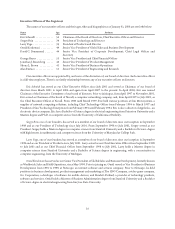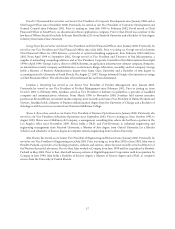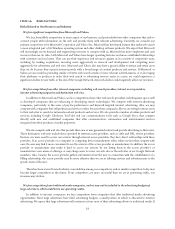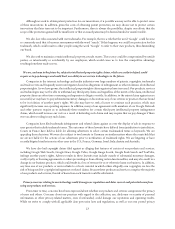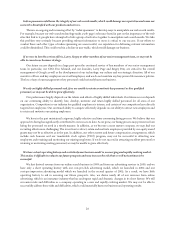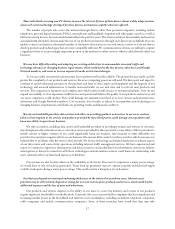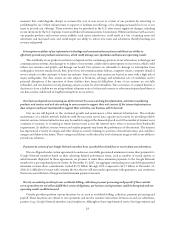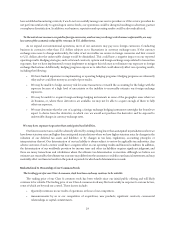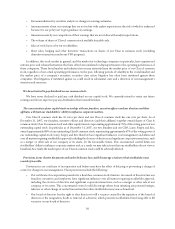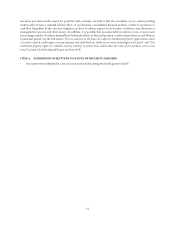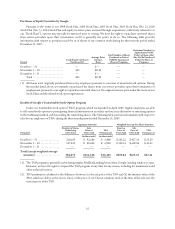Google 2007 Annual Report Download - page 40
Download and view the complete annual report
Please find page 40 of the 2007 Google annual report below. You can navigate through the pages in the report by either clicking on the pages listed below, or by using the keyword search tool below to find specific information within the annual report.Index spammers could harm the integrity of our web search results, which could damage our reputation and cause our
users to be dissatisfied with our products and services.
There is an ongoing and increasing effort by “index spammers” to develop ways to manipulate our web search results.
For example, because our web search technology ranks a web page’s relevance based in part on the importance of the web
sites that link to it, people have attempted to link a group of web sites together to manipulate web search results. We take
this problem very seriously because providing relevant information to users is critical to our success. If our efforts to
combat these and other types of index spamming are unsuccessful, our reputation for delivering relevant information
could be diminished. This could result in a decline in user traffic, which would damage our business.
If we were to lose the services of Eric, Larry, Sergey or other members of our senior management team, we may not be
able to execute our business strategy.
Our future success depends in a large part upon the continued service of key members of our senior management
team. In particular, our CEO, Eric Schmidt, and our founders, Larry Page and Sergey Brin, are critical to the overall
management of Google as well as the development of our technology, our culture and our strategic direction. All of our
executive officers and key employees are at-will employees, and we do not maintain any key-person life insurance policies.
The loss of any of our management or key personnel could seriously harm our business.
We rely on highly skilled personnel and, if we are unable to retain or motivate key personnel or hire qualified
personnel, we may not be able to grow effectively.
Our performance largely depends on the talents and efforts of highly skilled individuals. Our future success depends
on our continuing ability to identify, hire, develop, motivate and retain highly skilled personnel for all areas of our
organization. Competition in our industry for qualified employees is intense, and certain of our competitors have directly
targeted our employees. Our continued ability to compete effectively depends on our ability to attract new employees and
to retain and motivate our existing employees.
We have in the past maintained a rigorous, highly selective and time-consuming hiring process. We believe that our
approach to hiring has significantly contributed to our success to date. As we grow, our hiring process may prevent us from
hiring the personnel we need in a timely manner. In addition, as we become a more mature company, we may find our
recruiting efforts more challenging. The incentives to attract, retain and motivate employees provided by our equity award
grants may not be as effective as in the past. In addition, our other current and future compensation arrangements, which
include cash bonuses and our transferable stock option (TSO) program, may not be successful in attracting new
employees and retaining and motivating our existing employees. If we do not succeed in attracting excellent personnel or
retaining or motivating existing personnel, we may be unable to grow effectively.
We have a short operating history and a relatively new business model in an emerging and rapidly evolving market.
This makes it difficult to evaluate our future prospects and may increase the risk that we will not continue to be
successful.
We first derived revenue from our online search business in 1999 and from our advertising services in 2000, and we
have only a short operating history with our cost-per-click advertising model, which we launched in 2002 and our
cost-per-impression advertising model which we launched in the second quarter of 2005. As a result, we have little
operating history to aid in assessing our future prospects. Also, we derive nearly all of our revenues from online
advertising, which is an immature industry that has undergone rapid and dramatic changes in its short history. We will
encounter risks and difficulties as a company operating in a new and rapidly evolving market. We may not be able to
successfully address these risks and difficulties, which could materially harm our business and operating results.
26


